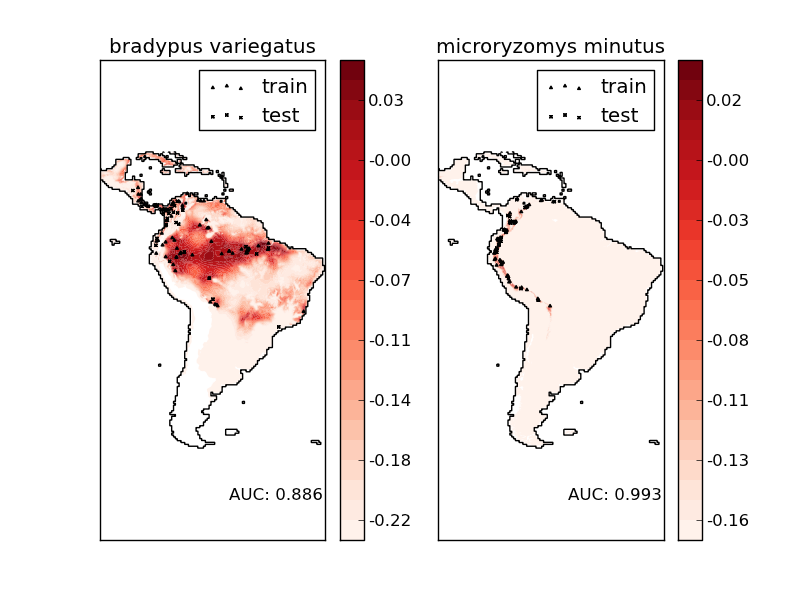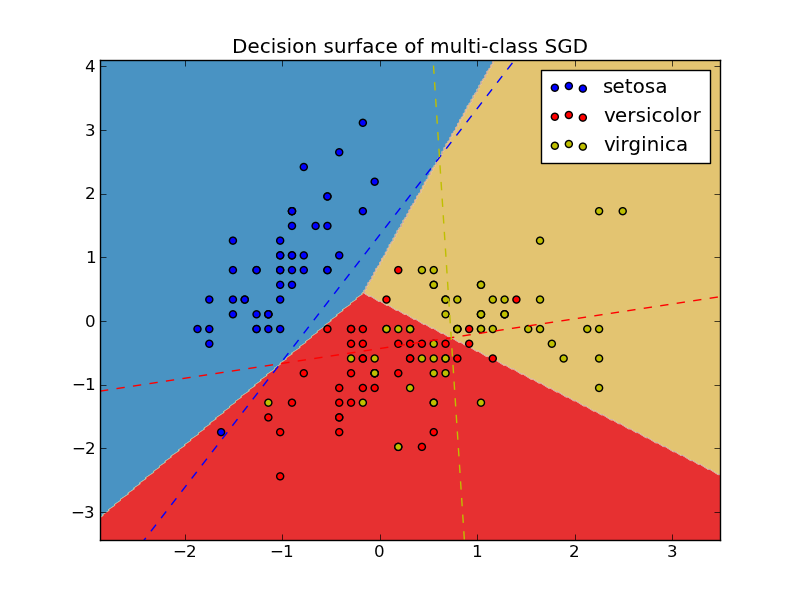0.8¶
scikits.learn 0.8 was released on May 2011, one month after the first “international” scikit-learn coding sprint and is marked by the inclusion of important modules: Hierarchical clustering, Partial Least Squares, Non-negative matrix factorization (NMF), initial support for Python 3 and by important enhacements and bug fixes.
Changelog¶
Several new modules where introduced during this release:
- New Hierarchical clustering module by Vincent Michel, Bertrand Thirion, Alexandre Gramfort and Gael Varoquaux.
- Kernel PCA implementation by Mathieu Blondel
- The Labeled Faces in the Wild face recognition dataset by Olivier Grisel.
- New Partial Least Squares module by Edouard Duchesnay.
- Non-negative matrix factorization (NMF) module Vlad Niculae
- Implementation of the Oracle Approximating Shrinkage algorithm by Virgile Fritsch in the Covariance estimation module.
Some other modules benefited from significant improvements or cleanups.
- Initial support for Python 3: builds and imports cleanly, some modules are usable while others have failing tests by Fabian Pedregosa.
- decomposition.PCA is now usable from the Pipeline object by Olivier Grisel.
- Guide How to optimize for speed by Olivier Grisel.
- Fixes for memory leaks in libsvm bindings, 64-bit safer BallTree by Lars Buitinck.
- bug and style fixing in K-means algorithm by Jan Schlüter.
- Add attribute coverged to Gaussian Mixture Models by Vincent Schut.
- Implement transform, predict_log_proba in lda.LDA by Mathieu Blondel.
- Refactoring in the Support Vector Machines module and bug fixes by Fabian Pedregosa, Gael Varoquaux and Amit Aides.
- Refactored SGD module (removed code duplication, better variable naming), added interface for sample weight by Peter Prettenhofer.
- Wrapped BallTree with Cython by Thouis (Ray) Jones.
- Added function svm.l1_min_c by Paolo Losi.
- Typos, doc style, etc. by Yaroslav Halchenko, Gael Varoquaux, Olivier Grisel, Yann Malet, Nicolas Pinto, Lars Buitinck and Fabian Pedregosa.
People¶
People that made this release possible preceeded by number of commits:
- 159 Olivier Grisel
- 96 Gael Varoquaux
- 96 Vlad Niculae
- 94 Fabian Pedregosa
- 36 Alexandre Gramfort
- 32 Paolo Losi
- 31 Edouard Duchesnay
- 30 Mathieu Blondel
- 25 Peter Prettenhofer
- 22 Nicolas Pinto
- 11 Virgile Fritsch
- 7 Lars Buitinck
- 6 Vincent Michel
- 5 Bertrand Thirion
- 4 Thouis (Ray) Jones
- 4 Vincent Schut
- 3 Jan Schlüter
- 2 Julien Miotte
- 2 Matthieu Perrot
- 2 Yann Malet
- 2 Yaroslav Halchenko
- 1 Amit Aides
- 1 Andreas Müller
- 1 Feth Arezki
- 1 Meng Xinfan
0.7¶
scikits.learn 0.7 was released in March 2011, roughly three months after the 0.6 release. This release is marked by the speed improvements in existing algorithms like k-Nearest Neighbors and K-Means algorithm and by the inclusion of an efficient algorithm for computing the Ridge Generalized Cross Validation solution. Unlike the preceding release, no new modules where added to this release.
Changelog¶
- Performance improvements for Gaussian Mixture Model sampling [Jan Schlüter].
- Implementation of efficient leave-one-out cross-validated Ridge in linear_model.RidgeCV [Mathieu Blondel]
- Better handling of collinearity and early stopping in linear_model.lars_path [Alexandre Gramfort and Fabian Pedregosa].
- Fixes for liblinear ordering of labels and sign of coefficients [Dan Yamins, Paolo Losi, Mathieu Blondel and Fabian Pedregosa].
- Performance improvements for Nearest Neighbors algorithm in high-dimensional spaces [Fabian Pedregosa].
- Performance improvements for cluster.KMeans [Gael Varoquaux and James Bergstra].
- Sanity checks for SVM-based classes [Mathieu Blondel].
- Refactoring of neighbors.NeighborsClassifier and neighbors.kneighbors_graph: added different algorithms for the k-Nearest Neighbor Search and implemented a more stable algorithm for finding barycenter weigths. Also added some developer documentation for this module, see notes_neighbors for more information [Fabian Pedregosa].
- Documentation improvements: Added pca.RandomizedPCA and linear_model.LogisticRegression to the class reference. Also added references of matrices used for clustering and other fixes [Gael Varoquaux, Fabian Pedregosa, Mathieu Blondel, Olivier Grisel, Virgile Fritsch , Emmanuelle Gouillart]
- Binded decision_function in classes that make use of liblinear, dense and sparse variants, like svm.LinearSVC or linear_model.LogisticRegression [Fabian Pedregosa].
- Performance and API improvements to metrics.euclidean_distances and to pca.RandomizedPCA [James Bergstra].
- Fix compilation issues under NetBSD [Kamel Ibn Hassen Derouiche]
- Allow input sequences of different lengths in hmm.GaussianHMM [Ron Weiss].
- Fix bug in affinity propagation caused by incorrect indexing [Xinfan Meng]
People¶
People that made this release possible preceeded by number of commits:
- 85 Fabian Pedregosa
- 67 Mathieu Blondel
- 20 Alexandre Gramfort
- 19 James Bergstra
- 14 Dan Yamins
- 13 Olivier Grisel
- 12 Gael Varoquaux
- 4 Edouard Duchesnay
- 4 Ron Weiss
- 2 Satrajit Ghosh
- 2 Vincent Dubourg
- 1 Emmanuelle Gouillart
- 1 Kamel Ibn Hassen Derouiche
- 1 Paolo Losi
- 1 VirgileFritsch
- 1 Yaroslav Halchenko
- 1 Xinfan Meng
0.6¶
scikits.learn 0.6 was released on december 2010. It is marked by the inclusion of several new modules and a general renaming of old ones. It is also marked by the inclusion of new example, including applications to real-world datasets.
Changelog¶
- New stochastic gradient descent module by Peter Prettenhofer. The module comes with complete documentation and examples.
- Improved svm module: memory consumption has been reduced by 50%, heuristic to automatically set class weights, possibility to assign weights to samples (see SVM: Weighted samples for an example).
- New Gaussian Processes module by Vincent Dubourg. This module also has great documentation and some very neat examples. See Gaussian Processes regression: basic introductory example or Gaussian Processes classification example: exploiting the probabilistic output for a taste of what can be done.
- It is now possible to use liblinear’s Multi-class SVC (option multi_class in svm.LinearSVC)
- New features and performance improvements of text feature extraction.
- Improved sparse matrix support, both in main classes (grid_search.GridSearchCV) as in modules scikits.learn.svm.sparse and scikits.learn.linear_model.sparse.
- Lots of cool new examples and a new section that uses real-world datasets was created. These include: example_applications_plot_face_recognition.py, Species distribution modeling, Libsvm GUI, Wikipedia princial eigenvector and others.
- Faster Least Angle Regression algorithm. It is now 2x faster than the R version on worst case and up to 10x times faster on some cases.
- Faster coordinate descent algorithm. In particular, the full path version of lasso (linear_model.lasso_path) is more than 200x times faster than before.
- It is now possible to get probability estimates from a linear_model.LogisticRegression model.
- module renaming: the glm module has been renamed to linear_model, the gmm module has been included into the more general mixture model and the sgd module has been included in linear_model.
- Lots of bug fixes and documentation improvements.
People¶
People that made this release possible preceeded by number of commits:
- 207 Olivier Grisel
- 167 Fabian Pedregosa
- 97 Peter Prettenhofer
- 68 Alexandre Gramfort
- 59 Mathieu Blondel
- 55 Gael Varoquaux
- 33 Vincent Dubourg
- 21 Ron Weiss
- 9 Bertrand Thirion
- 3 Alexandre Passos
- 3 Anne-Laure Fouque
- 2 Ronan Amicel
- 1 Christian Osendorfer
0.5¶
Changelog¶
New classes¶
- Support for sparse matrices in some classifiers of modules svm and linear_model (see svm.sparse.SVC, svm.sparse.SVR, svm.sparse.LinearSVC, linear_model.sparse.Lasso, linear_model.sparse.ElasticNet)
- New pipeline.Pipeline object to compose different estimators.
- Recursive Feature Elimination routines in module Feature selection.
- Addition of various classes capable of cross validation in the linear_model module (linear_model.LassoCV, linear_model.ElasticNetCV, etc.).
- New, more efficient LARS algorithm implementation. The Lasso variant of the algorithm is also implemented. See linear_model.lars_path, linear_model.LARS and linear_model.LassoLARS.
- New Hidden Markov Models module (see classes hmm.GaussianHMM, hmm.MultinomialHMM, hmm.GMMHMM)
- New module feature_extraction (see class reference)
- New FastICA algorithm in module scikits.learn.fastica
Documentation¶
- Improved documentation for many modules, now separating narrative documentation from the class reference. As an example, see documentation for the SVM module and the complete class reference.
Fixes¶
- API changes: adhere variable names to PEP-8, give more meaningful names.
- Fixes for svm module to run on a shared memory context (multiprocessing).
- It is again possible to generate latex (and thus PDF) from the sphinx docs.
Examples¶
- new examples using some of the mlcomp datasets: Classification of text documents: using a MLComp dataset, example_mlcomp_document_classification.py
- Many more examaples. See here the full list of examples.
External dependencies¶
- Joblib is now a dependencie of this package, although it is shipped with (scikits.learn.externals.joblib).
Removed modules¶
- Module ann (Artificial Neural Networks) has been removed from the distribution. Users wanting this sort of algorithms should take a look into pybrain.
Misc¶
- New sphinx theme for the web page.
Authors¶
The following is a list of authors for this release, preceeded by number of commits:
- 262 Fabian Pedregosa
- 240 Gael Varoquaux
- 149 Alexandre Gramfort
- 116 Olivier Grisel
- 40 Vincent Michel
- 38 Ron Weiss
- 23 Matthieu Perrot
- 10 Bertrand Thirion
- 7 Yaroslav Halchenko
- 9 VirgileFritsch
- 6 Edouard Duchesnay
- 4 Mathieu Blondel
- 1 Ariel Rokem
- 1 Matthieu Brucher
0.4¶
Changelog¶
Major changes in this release include:
- Coordinate Descent algorithm (Lasso, ElasticNet) refactoring & speed improvements (roughly 100x times faster).
- Coordinate Descent Refactoring (and bug fixing) for consistency with R’s package GLMNET.
- New metrics module.
- New GMM module contributed by Ron Weiss.
- Implementation of the LARS algorithm (without Lasso variant for now).
- feature_selection module redesign.
- Migration to GIT as content management system.
- Removal of obsolete attrselect module.
- Rename of private compiled extensions (aded underscore).
- Removal of legacy unmaintained code.
- Documentation improvements (both docstring and rst).
- Improvement of the build system to (optionally) link with MKL. Also, provide a lite BLAS implementation in case no system-wide BLAS is found.
- Lots of new examples.
- Many, many bug fixes ...
Authors¶
The committer list for this release is the following (preceded by number of commits):
- 143 Fabian Pedregosa
- 35 Alexandre Gramfort
- 34 Olivier Grisel
- 11 Gael Varoquaux
- 5 Yaroslav Halchenko
- 2 Vincent Michel
- 1 Chris Filo Gorgolewski




